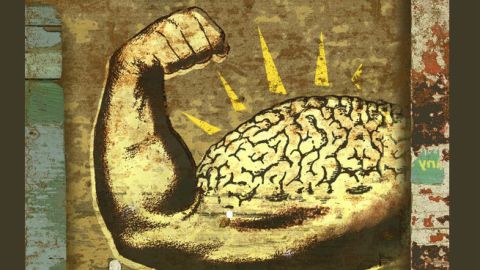How I Learned to Stop Worrying and Love the Standardized Test

Most of us see standardized tests as a necessary evil or a totally unnecessary waste of time. Shawn O’Connor may be the only person in the world who says he looks forward to them.
And his track record bears him out. At just 32, he’s earned an M.B.A., a J.D. from Harvard, multiple scholarships, a medal for his G.P.A. – and a near perfect score on the GMAT and LSAT. You could hate him. Or you could learn from him. The former Congressional-adviser-cum-human-rights-lawyer has turned his virtuosic study skills into a tutoring service, Stratus Prep, which he hopes to position as the small business answer to Kaplan. (90% of Stratus Prep students score in the 82nd percentile or above on the GMAT, and their average LSAT score increase is the highest in the U.S.)
What’s the Big Idea?
In a recent interview, Big Think asked O’Connor to share his secrets for coaxing a brilliant performance from even the most burnt-out brain. “What I find really extraordinary about standardized tests is you can constantly discover layer after layer of nuance,” he says. “I love breaking problems into their component parts and trying to understand the little traps that test writers have embedded into the exam.” When students come to O’Connor for help, he tells them to look at the test from the test writer’s perspective.
The first step is to know what you’re up against: is the test skill- or content- based? If it asks you to describe three factors that lead up to the French revolution or recall the name of an obscure piece of legislature, it’s content-based. If it asks you to take action (i.e. complete a syllogism) it’s skill-based. Acing a skill-based assessment like the SAT or the LSAT requires regular practice over an extended period of time, about three to six months in O’Connor’s estimation. The goal is to get comfortable with the language and format so that when you see a question, you understand exactly what you’re expected to do.
On the other hand, you only need one to two weeks to prepare for a test that aims to evaluate content knowledge. “Hyper-focus the week or two before and then use mnemonic devices to help you. You’re going to need to retain all of the information you’re memorizing.” If you’re overwhelmed by the breadth of knowledge you’re expected to absorb, break the material down into parts, sub-parts and “sub, sub-parts” to make it more bearable.
But remember: studying is not a full time job, and treating it like one is counterproductive. “We certainly don’t want you practicing eight hours a day,” says O’Connor. Cramming may feel virtuous, but it’s actually inefficient. Stratus Prep students study only 2-3 hours a day and take a practice test every other day. On off days, they review their practice tests.
What’s the Significance?
According to O’Connor, the secret to excelling on a test is seeing patterns everywhere: from the wording of the instructions to the nuances of your own gray matter.
One of the biggest mistakes people make when preparing for a test is failing to review practice tests after they take them. “If you just keep repeating tests over and over and over, you’ll improve, but our statistics show you only improve about five to ten percent,” he says. Instead, notice where you make repeated mistakes, then develop strategies to get around them. The bad news? It’s hard work, just like your mother told you. The good news? “These tests are very, very, very learnable.” And maybe, sometimes, occasionally, kind of fun.
Even if you’re not currently in school, research on test preparation is meaningful for you if you’re interested in lifelong learning, with implications on how we all absorb information and acquire new skills. Cognitive scientists have long known that memory performance improves with practice, cutting retrieval time by more than 50%.
However, recent studies show that a general theory of “the more practice the better” is not the right way to memorize or solve problems. The way you practice must be deliberate and include active monitoring of your experience. “Rehearsal improves memory only if the material is rehearsed in a deep and meaningful way. Passive rehearsal does not result in better memory,” says John Anderson, a psychology professor at Carnegie Mellon.
Whatever you’re up against next, whether it’s an admissions exam or a job interview at Google, think of it as a riddle. If you notice the clues,
you’re going to be able to solve a problem in three minutes, whereas somebody who doesn’t see them is going to take 11, 12, 13 minutes. Trying to uncover the mystery of what the test writers embedded into the exam is not only tremendously intellectually interesting and challenging, but it’s also where you can really have demonstrable results.





